Why are people so mean to each other online?
- Published
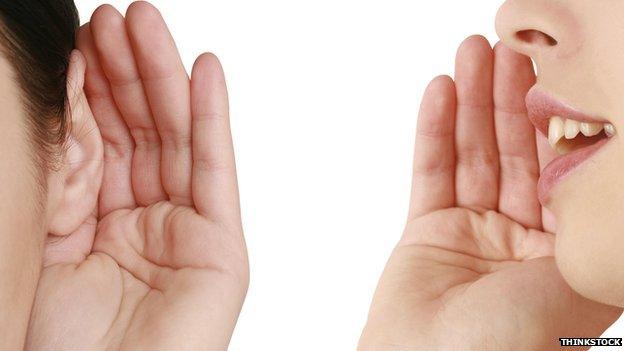
Gossip has made the world go around for centuries but in the digital age has it become more malicious?
It used to be the case that people got their gossip over the garden fence or from a bit of curtain twitching. But now we have the internet and the nature of chat has changed forever.
They way we communicate online jumped back into the headlines last week when Monica Lewinsky, famous for her love affair with President Clinton, spoke at the Ted (Technology, Entertainment and Design) conference in Vancouver.
Describing herself as one of the first victims of cyber-gossip, she said that it had taken her over a decade to get over it. Now back in the public eye, she called for a more compassionate internet.
Community spirit?
We have all seen nasty comments online - whether they be a row on Twitter or a catty response on Facebook.

Was the community spirit embodied in dramas such as Call the Midwife real or imagined?
The internet acts like a kind of digital-fuelled alcohol, freeing us to say things to strangers that we would never dare to say if we met them.
Dave Harte, a lecturer in media communication at Birmingham City University, believes that social media gives us a connection with each other that we are all craving.
"We have a vague sense of having lost something - the idea of chatting to a neighbour or meeting at the village post office. In many ways it is a media-created perception. Maybe we have all watched too many episodes of 'Call the Midwife'," he said.
"But we are always trying to retrieve it and having a digital presence can often seem like a trouble-free replacement for meeting each other."
Even back in the early days of the internet, online chat could very easily turn sour.
"Discussions in these groups would have followed a similar pattern. People with shared interests come together but often they would disintegrate because the internet gives people the opportunity to say things that you wouldn't say face to face," said Mr Harte.
Heartbreaking comments
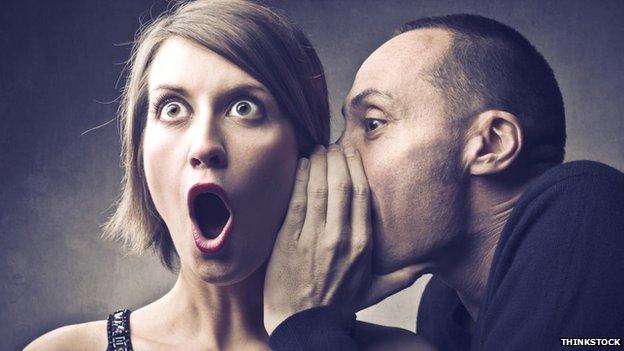
Online gossip is easily spread and not easily retracted
Trolling has become an established term for people who sow discord on the internet by starting arguments - and there are a lot of them around.
Women seem to be particularly prone - a survey conducted by cosmetics firm Dove and Twitter found that in 2014 over five million negative tweets were posted about beauty and body image - and four out of five of them appeared to come from women.
Danah Boyd, principal researcher at Microsoft Research and a recognised expert on how we use social media, commented in a recent blog, external: "Over the last few years, as the internet went from being a geeky subculture to something that is truly mainstream, I started watching as young women used technology to demean themselves and each other. It has broken my heart over and over again."
"It's high time that we all stop and reflect on what we're saying and posting when we use our fingers to talk in public," she concluded.
Following the survey, Twitter has set up a partnership with Dove dubbed #SpeakBeautiful aimed at trying to counteract internet negativity.
Suburban gossip
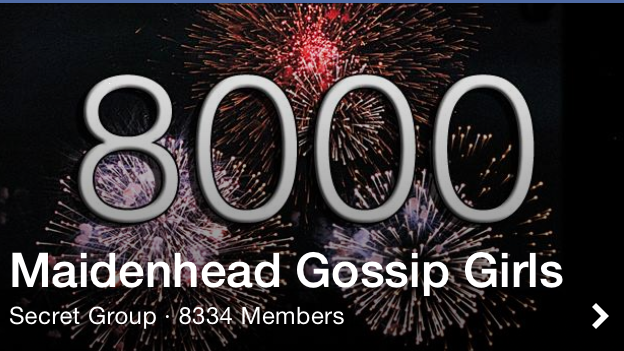
Maidenhead Gossip Girls started off a site to provide local information but also hosts a lot of arguments
I know a bit about how women interact online because, until recently, I was a member of a Facebook group called Maidenhead Gossip Girls - made up of 8,000 plus women based in or around the Thames-side Berkshire town.
Funnily enough there wasn't a lot of gossip on it. Instead there were lots of questions asking for recommendations for local tradespeople, good restaurants to visit, things to do with the kids on a wet Bank Holiday weekend.
People posted pictures of their children's rashes and asked for an online diagnosis.
Some seemed never to have heard of search engines, asking questions for which the obvious answer was "Google it".
And a few members made no distinction between the group they had joined with 7,999 strangers and their own personal Facebook page, sharing information that could easily be prefaced with the words 'too much'.
There were lots of positive posts on there - requests for charity donations elicited many responses, lone mothers were put in touch with others in the same situation, requests to help out a down-on-their-luck friend with old furniture brought floods of offers and a picture of a lost teddy found in the street meant the toy was quickly reunited with its distraught child-owner.
But there were also a lot of arguments.
A woman asking for recommendations for where to get her young daughter's ears pierced got more than she bargained for when several group members questioned whether ear-piercing for a young child was something she should even be considering.
Others hopped in to defend her right to ask the question and soon the argument had moved far beyond the original question.
Seemingly innocent threads recommending a local clairvoyant, asking how to treat Thrush, where to buy a paper lantern or simply showing off about how a toddler had learned to read - all seemed to blow up into heated discussions.
Some of the more inflammatory posts would run to hundreds of comments, each getting a little snipier than the last.

Maidenhead Mumble wanted to do away with arguments and introduce a bit of fun
Little wonder then that one disaffected member decided to start her own group.
Dubbed The Maidenhead Mumble (MM) it was clear from the start it would be a satirical version of MGG.
Posts on MGG - now known to members of the new group as "dark side" - were parodied. Pictures of severed fingers were posted next to questions ' should I go to the doctors or just put a plaster on it?"
People referred to each other as "tossers" and there was quite a lot of swearing - not really allowed on MGG.
If MGG was a pleasant cafe by the river Thames where respectable mums drank coffee, MM was a smokey bar where shots were the preferred choice.
And while there were, refreshingly, no arguments between members, it was developing a dark side of its own with individuals from MGG singled out and openly ridiculed.
There was also clearly a double-agent - referred to as "the mole" - who was passing information back to MGG on what was happening on MM.
As a result, people who had posted in the new group suddenly found themselves barred from MGG. Including me.
Initially outraged that I had been blocked when I hadn't broken any of its rules - I had never even posted on the group - I contacted the administrators; five local women.
Be nicer
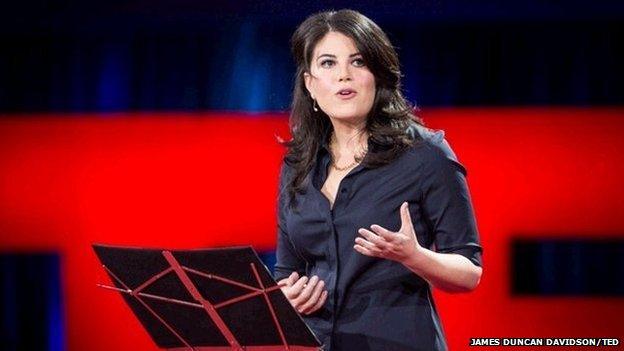
Monica Lewnisky was subject to negative online comments and jokes that were emailed around the world
I was offered no explanation as to why I was removed and when I said I was going to write something on the BBC about it, I was told "no comment".
Facebook confirmed that it was up to administrators to make decisions about members and if they wanted to change the settings from Public to Secret they could, removing whoever they chose along the way - even if they hadn't broken any rules.
The social network did not want to comment specifically on my case but more generally a spokeswoman said: "Unfortunately there are some people who set out to annoy or frustrate others online, just as in everyday life. Our rules and tools are designed to help keep Facebook a respectful place for the 1.3 billion people who use our service around the world."
The problem is that the nature of the internet means that within groups and the wider social networks we are all part of, people are only a few clicks away from being able to annoy frustrate or upset a whole range of people - often strangers.
And for many the temptation to respond to a post they find annoying or frustrating is just too hard to resist - as I encountered on MGG.
What we do to counteract that is unclear but we could start by following the advice of the woman who has been victim to more cyber-gossip and net negativity than perhaps any other.
During her Ted speech, Ms Lewinsky urged people simply to "post something positive".
- Published19 March 2015
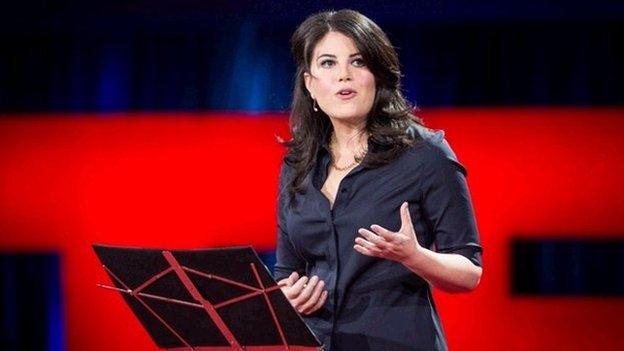
- Published11 February 2014
